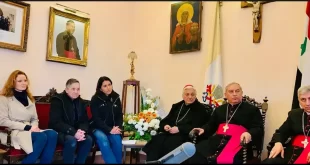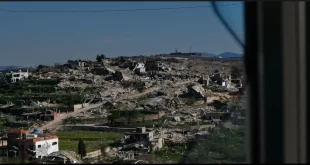April 10, 2017, Consortiumnews.com – Rick Sterling
Exclusive: The mainstream U.S. media now reports as “flat-fact” the Syrian government’s guilt in the April 4 chemical weapons incident, but the real facts are less clear and some point in the opposite direction, says Rick Sterling.
Historian and journalist Stephen Kinzer has said, “Coverage of the Syrian war will be remembered as one of the most shameful episodes in the history of the American press.” This past week’s coverage of the April 4 chemical-weapons incident in the northern Syrian town of Khan Sheikhoun will only add to that dubious legacy.

Across the mainstream U.S. news media, there was almost no skepticism shown and virtually no differences of opinion allowed. Within hours, the rush to judgment that Syrian President Bashar al-Assad was guilty had solidified into a full-scale groupthink.
For instance, the PBS Newshour, which typically on Syria has offered up on-air “debates” using two guests who share the same basic hostility toward the Assad government, did the same on April 4, allowing two harsh opponents to say basically whatever they wanted.
Susannah Sirkin from the Soros-funded Physicians for Human Rights claimed, “We know that sarin has been used before by the Assad regime.” But that has NOT been confirmed by any credible organization. On the contrary, the most thorough investigations point to sarin being used by the armed opposition, NOT the Syrian government.
The other guest was Andrew Tabler from the neoconservative Israeli-associated Washington Institute for Near East Policy. His editorial from last fall makes clear what he wants: “The case for (finally) bombing Assad.” So, the viewers of the publicly funded network got one of their usual doses of “Assad must go” propaganda.
The New York Times, for its first-day lead story entitled “Worst Chemical Attack in Years in Syria; U.S. Blames Assad,” turned to national security correspondent Michael Gordon, who somehow remains a “respected” journalist despite his influential role in promoting the WMD myth that helped justify the 2003 invasion of Iraq. In this instance, Gordon and co-author Anne Barnard presented the case against the Syrian government pretty much as you might expect, announcing Assad’s conviction even before there was any time for even a cursory investigation.
In reference to the 2013 sarin case, they also pronounced that “American intelligence agencies concluded” the 2013 attack was carried out by the Syrian government, but that too was false. The intelligence agencies did NOT agree with the Obama administration’s politically driven claims and that forced the White House to come up with a new genre of report, called a “government assessment” rather than the traditional “intelligence estimate.”
It is astounding that Gordon and Barnard, two supposed experts on the Middle East and national security, did not know this or, perhaps less astounding, that they would let their biases intentionally mislead the public. Veteran Intelligence Professionals for Sanity explained the significance of the Obama administration’s sleight of hand in a memorandum, “A Call for Syria – Sarin Proof”.
But progressives might say that all that is run-of-the-mill at PBS and The New York Times. So, they switched on “DemocracyNow” looking for a thoughtful alternative. Except that, “DemocracyNow” has been highly biased in its presentation on Syria. It almost solely promotes the perspective of those who support the armed opposition and/or Western intervention in Syria.
On April 5, the show’s hosts interviewed Dr. Rola Hallam, infamous for being the key player in the documentary “Saving Syria’s Children” which purports to show a napalm or chemical weapon attack in Aleppo but which has come under criticism as apparently staged. On April 6, “DemocracyNow” interviewed another “Syrian” who lives in the West and promotes Western intervention: Lina Sergie Attar.
Not to surprise anyone, but the media’s performance on CNN, MSNBC and other networks was no better. Across the U.S. mainstream media spectrum, there was virtually no diversity in opinion regarding what may or may not have happened in Khan Sheikhoun. Everyone just knew that Assad was guilty.
It also should not be too surprising that President Trump – after months of getting bashed for seeking better relations with Russia and for trying to change America’s “regime change” foreign policy – used this occasion to reposition himself as a new tough-guy “war president” to the acclaim of neocons and liberal interventionists.
A Closer Look
So what did happen in Khan Sheikhoun? The story actually may have started a couple of weeks earlier. On March 22, anti-government militants overran the government-controlled town of Khattab and kidnapped some civilians who were taken to the nearby opposition-controlled town of Khan Sheikhoun.
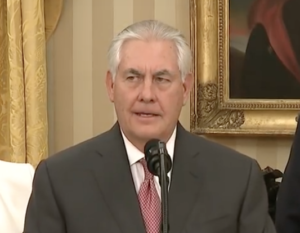
On March 30, Secretary of State Rex Tillerson and U.S. Ambassador to the United Nations Nicki Haley indicated that the removal of Assad was no longer a U.S. priority, instead the focus would be on defeating the Islamic State and other terror groups. Tillerson said Assad’s future should be settled by the Syrian people, and Haley said the Trump administration would not “focus on getting Assad out.”
Those comments brought harsh criticism from American neoconservatives, liberal interventionists, Israeli leaders and others obsessed over the past six years with “regime change” in Syria.
Then, on April 4, there were sketchy reports of children and other civilians killed by chemical poisoning in the town of Khan Sheikhoun in Idlib province, an area controlled by Al Qaeda-connected rebels. Assad was immediately blamed for bombing civilians with chemical weapons, but some initial accounts were contradictory. Some claimed that people smelled the gas; others claimed the gas caused immediate death like odorless sarin. All told, some 80 people reportedly died in the incident. [Photographs, videos, analyses and other sources are documented at “A Closer Look At Syria.”]
But there were problems in assessing what exactly happened at Khan Sheikhoun, including the unreliability of some sources. One video featured U.K.-born-and-raised Dr. Shajul Islam, who had his U.K. medical license suspended due to reports he was involved in the kidnapping in Syria of journalist John Cantlie, who was later freed but then taken hostage again in 2012 along with American James Foley, who was later beheaded by ISIS. Cantlie remains a hostage.
After a criminal case against Shajul Islam in the U.K. collapsed because Cantlie and other victims could not testify, Islam somehow made his way back into Syria and into Al Qaeda’s territory. After the chemical weapons incident, Islam was widely cited by Western news outlets as a key source of information.
There are also curious features in the videos, which depict a scene set in a limestone quarry with apparent caves and storage depots along with flat-bed trucks with bodies scattered on the ground. Other videos show scenes in a medical clinic, while photographs show White Helmet “rescue workers” handling bodies without gloves, which is very strange if the people had died or were dying from chemical poison.
But the on-scene reports were immediately accepted at face value by the Western media, which has long been inclined to believe any negative claims about Assad. Just as quickly, Sen. John McCain and other neoconservatives joined the chorus, recalling the old conventional wisdom about President Obama not enforcing his “red line” after the 2013 sarin case (since it remains the ill-informed groupthink in Washington that Assad ordered that sarin attack). Israeli Prime Minister Benjamin Netanyahu chimed in, too, with a renewed call for war on Syria, tweeting that it’s time for the international community to “fulfill its obligations from 2013.”
Under this cacophony of anti-Assad outrage – before any serious collection of evidence could occur – the Trump administration began endorsing the interpretation of an Assad-regime airstrike delivering poison gas. On April 5, President Trump publicly blamed the Syrian government despite the conflicting reports.
He said, “Yesterday’s chemical attack in Syria [was] against innocent people including women, small children and even beautiful little babies. Their deaths was an affront to humanity. These heinous actions by the Assad regime cannot be tolerated … my attitude toward Syria and Assad has changed very much.”
Just a day later, on April 6, Trump ordered a “targeted military strike” on Syria with 59 Tomahawk missiles attacking a Syrian air base near Homs. The base is used to support the combat against ISIS in eastern Syria and against Al Qaeda’s Nusra affiliate in Idlib province. According to reports from Syria, the missile strike killed seven or eight soldiers and some nine civilians, including four children. But the attack earned Trump plaudits from many of his harshest foreign policy critics in the political world and the mainstream media.
The Theories
But the real story behind the deaths in Khan Sheikhoun remains uncertain, with U.S. intelligence apparently still trying to unravel the mystery and with some logic pointing to the armed opposition as the perpetrators, not the Syrian government.
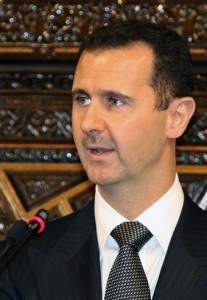
There are four basic theories about what happened:
-The dominant Western narrative is that the Syrian “regime” dropped illegal chemical weapons on civilians because it is simply barbaric or alternatively because it was celebrating its impunity following the Trump administration’s announcement that it was no longer seeking Assad’s ouster.
-Then, there’s the possibility of an accidental release of chemicals because an airstrike by the Syrian military hit an Al Qaeda weapons depot where chemical weapons were stored, rupturing the containers and causing the poison gas to spread over the area. The Russian Ministry of Defense says militants had a weapons production factory including chemical weapon ingredients.
-Another theory is that the deaths were part of a psychological operation in which the kidnapped civilians from Khattab and possibly others were killed or poisoned in a staged event prompted by the growing desperation of Al Qaeda and other rebel groups, especially after the late March announcement that the U.S. was no longer seeking Assad’s removal.
-There is also the possibility that an outside power, angered by the Trump administration’s announcement, assisted in the psychological operation by delivering the poison gas that was used on the town.
Despite Trump’s hasty decision to blame and punish the Assad government, U.S. intelligence analysts are reportedly still reviewing the evidence, which includes overhead surveillance of the area. However, because the President has already acted, whatever the CIA concludes – if it contradicts Trump – may remain secret for the indefinite future.
Still, there are facts, history and circumstantial reasons that would lead one to believe that it is far more likely the armed opposition is responsible than the government.
(1) The incident and publicity help the opposition and hurt the government.
Crime investigations usually begin with the question: Who has a motive? In this case, it’s strikingly clear that the armed opposition and their supporters benefited from this event. They have used the story to further demonize the Assad government and renew calls for the U.S. and “the world” to intervene.
Not only did the incident cause the Trump administration to reverse its recently announced reversal of Obama’s “Assad must go” mantra, but the deaths came as the Syrian government is making steady advances in many parts of the country. The government had no reason to use chemical weapons even if it still had any after surrendering its stockpiles of such weapons in 2014. Indeed, the government had every reason NOT to use chemical weapons, knowing very well the armed opposition’s propaganda capabilities and access to the major Western media.
It is also relevant to consider timing. In this case, the events in Khan Sheikhoun occurred the day before an important conference on Syria was to be held in Brussels. The conference titled “Supporting the future of Syria and the region” has been effectively sidetracked by news about the chemical weapons attack and the Syrian government being blamed.
(2) Extremists were likely responsible for the August 2013 chemical weapon attack in Damascus.
Western supporters of the armed opposition were quick to blame the Syrian government for the chemical attack in Ghouta on Aug. 21, 2013. However, subsequent investigations by the most credible investigative journalists and researchers concluded the Syrian government was probably NOT responsible. Seymour Hersh and Robert Parry concluded the attack was most likely carried out by militants with support from Turkish intelligence.
The in-depth examination titled WhoGhouta concluded “The only plausible scenario that fits the evidence is an attack by opposition forces.” An MIT study made a detailed trajectory analysis and concluded that the sarin-carrying missile could not have been fired from government territory. The study challenged the unsubstantiated claims made in the U.S. “government assessment” white paper, which almost led President Obama to launch a military strike against Syrian government forces. “Faulty intelligence could have led to an unjustified US military action,” the MIT study said.
(3) Armed opposition groups have a history of staging incidents
From the start, the Syrian conflict has included an information war. Secretary of State Hillary Clinton boasted of “training for more than a thousand activists, students and independent journalists,” a program that amounted to an invitation for the armed opposition to sell its case to the West via propaganda on social media, including heartrending tales focused on suffering children and heroic stories of selfless “moderate” rebels and the even more selfless White Helmets “rescue workers.”
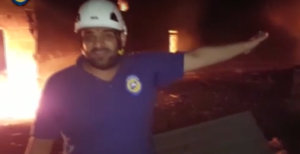
In December 2012, NBC journalist Richard Engel was reportedly kidnapped and abused by “shabiha” supporters of the Syrian government. Engel and his film crew were “liberated” by Free Syrian Army rebels after a gunfight with the supposedly pro-Assad kidnappers. In reality, the entire episode from kidnapping to rescue was a hoax designed to demonize Assad’s supporters and glorify the “rebels.” The true story emerged years later after the actual events were leaked. When it was going to be made public, Engel finally admitted the truth.
The world also now knows that the real kidnappers of Western journalists have been the jihadist rebels, who have decapitated hostages including Americans James Foley and Steven Sotloff.
(4) Supporters of the armed opposition have a history of fabricating stories to demonize the Syrian government.
In February 2014, it was announced that a defecting Syrian military photographer, who was anonymous but code-named “Caesar,” had 55,000 photos documenting the torture and murder of 11,000 innocent Syrian civilians. This news received sensational media attention with live interviews on CNN and front-page coverage throughout the Western world. The news relied on the judgment of legal prosecutors who “verified” the story and produced a “Caesar Report,” released the day before the start of Geneva peace negotiations. It effectively disrupted the talks and facilitated the “rebels” refusal to negotiate and walk away.
In reality, the “verification” and report was commissioned by the government of Qatar, which has been a major funder of the armed opposition. Since then it has been discovered that nearly half the 55,000 photos show the opposite of what was claimed: they show dead Syrian soldiers and victims of explosions NOT tortured civilians, just one of the findings of fraud in this sensational story. [A concise expose of “Caesar” is here.]
Lost in Propaganda
Between the reality that wars are always brutish affairs and the introduction of sophisticated propaganda that has exaggerated and fabricated abuses by the Syrian government, the West’s understanding of what’s been happening in Syria is understandably confused.
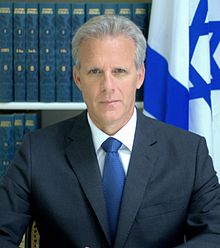
There is also the behind-the-scenes role of Israel and the U.S. neoconservatives who have had Syrian “regime change” on their wish list for decades – and more recently have indicated that they would even prefer a victory by Al Qaeda or the Islamic State to continuation of Assad’s rule because of his close ties to Iran.
As former Israeli Ambassador to the U.S. Michael Oren said, “we always wanted Bashar Assad to go, we always preferred the bad guys who weren’t backed by Iran to those who were backed by Iran.”
In 2010, before the conflict began, Secretary of State Hillary Clinton made clear to Damascus that the U.S. wanted Syria to accede to key Israeli demands: end its alliance with Hezbollah, reduce its interactions with Iran, and come to an agreement with Israel. When Syria rebuffed those demands, the “regime change” war began in 2011.
However, with the Russian intervention in support of the Syrian government in 2015 and the army’s recent liberation of eastern Aleppo, forcing the Al Qaeda-led rebels to relocate to northern Idlib Province, the prospects for the Israeli/neocon agenda looked bleak. Even worse, Donald Trump’s election seemed to presage a more practical approach toward resolving the Syrian conflict with Assad’s status left for future Syrian elections to decide.
That possibility became a stark reality at the end of March with the statements by Tillerson and Haley. But then – at this desperate moment for the long and bloody “regime change” struggle – came the remarkable “good fortune” of an apparent chemical weapons attack in the remote town of Khan Sheikhoun.
Now that Trump has again reversed his policy on Syria by launching a missile attack without waiting for a serious investigation or the emergence of hard evidence, he is getting congratulated by Congress and the media. Given Trump’s well-known hunger for approval, the danger of a head-on clash with nuclear-armed Russia – beginning but not ending in Syria – has suddenly and dramatically increased.
The wind is back in the sails of the armed opposition and their many foreign allies.
 Syria Support Movement solidarity with the Syrian people
Syria Support Movement solidarity with the Syrian people


